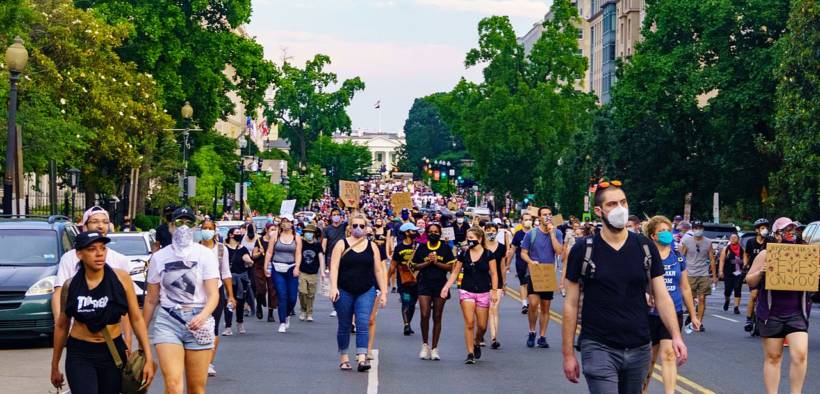The Charge of Racism is Partially Right and Partially Wrong

The made for TV murder showed a jack booted police officer with his knee on the neck of a handcuffed black man. face down on the pavement, crushing out his breath of life. Cities are in chaos throughout America in protest responses to yet one more murder of a non-white person by the police.
Against racism.
The charge of racism is partially right and partially wrong. The murder of George Floyd is a malevolent metaphor of life in the United States under the ruling class. Racism is a huge part of that larger class warfare being waged by those in power on those with less than. Less money, less education, less housing, less everything Except the power to protest inequity and inequality with people power.
What is it that the Masters of the Universe are not getting? What is it about the continuation of the slavery ethos through substandard salaries like having Apple pay Chinese workers $1.85/hour for a 12-hour shift, 6 days a week? What is that they don’t get by measuring the “health” of the U.S. economy by the Gross Domestic Product (GDP) that measures the value of goods and services produced in the United States. These numbers drive our national conversation about economic growth, yet they provide precious little information about the well-being of most Americans. Most Americans, not the 1 percent.
It’s no longer news that income inequality in the United States has been skyrocketing with larger shares of economic growth flowing to the very top of the income distribution – the most wealthy. From 1980 to 2014, pretax income growth for the top 1 percent of all earners was 204 percent in the United States, far above the national average of 61 percent. Over the same period, pretax incomes for the bottom 50 percent of individuals grew by just 1 percent.
Therefore, the official GDP growth statistic bears little resemblance to the experience of most Americans. Because it is a report of average growth across everyone in the United States, as incomes at the very top skyrocket, they drag the average up with them, making GDP growth less and less representative.
Congress commissioned economist Simon Kuznets to create a system that would measure the nation’s productivity in 1934 to better understand how to tackle the Great Depression. In his report, Kuznets warned against its use as a measure of human welfare.
Kuznets wrote, “…no income measurement undertakes to estimate the reverse side of income, that is, the intensity and unpleasantness of effort going into the earning of income. The welfare of a nation can, therefore, scarcely be inferred from a measurement of national income as defined above.”
In 1944, the GDP became the main tool for measuring the US economy. In 1962, Kuznets stated in The New Republic “Distinctions must be kept in mind between quantity and quality of growth, between costs and returns, and between the short and long run. Goals for more growth should specify more growth of what and for what.” “For what” is the question to ponder.
Ever since the development of GDP, many people have pointed out limitations of using GDP as the overarching measure of economic and social progress. For example, many environmentalists argue that the GDP is a poor measure of social progress because it does not take into account harm to the environment.
Money. The measurement of GDP has fostered a national fixation on “growing the pie” that ignores how growth is distributed. That conventional wisdom has become antiquated, as more and more of the nation’s growth has accrued to the top 1 percent. Most people work for their living. Not the Masters of the Universe; their money makes more money. No day job necessary.
Oh, the reaction by those who are decrying the violence and property destruction by the protesters! Mike Erlandson, a former chair of the Minnesota Democratic-Farmer-Labor Party, said he watched with his 15-year-old daughter in Minnesota this week as a man spray-painted on a wall, “F–k the white people from the suburbs.”
What else might we have expected? That the descendants of people who have been objectified since slavery was a “legal” institution of human chattel enslavement should have waited peacefully for justice to be administered?
Is there really any “progress,” any “justice” since the passage of the 13th Amendment in 1865? With one third of Americans living in poverty in the richest country in the world?
Here we are, with a pandemic unabated, an economy in meltdown, and communities in chaos over police killings. Does anyone believe change is possible?







